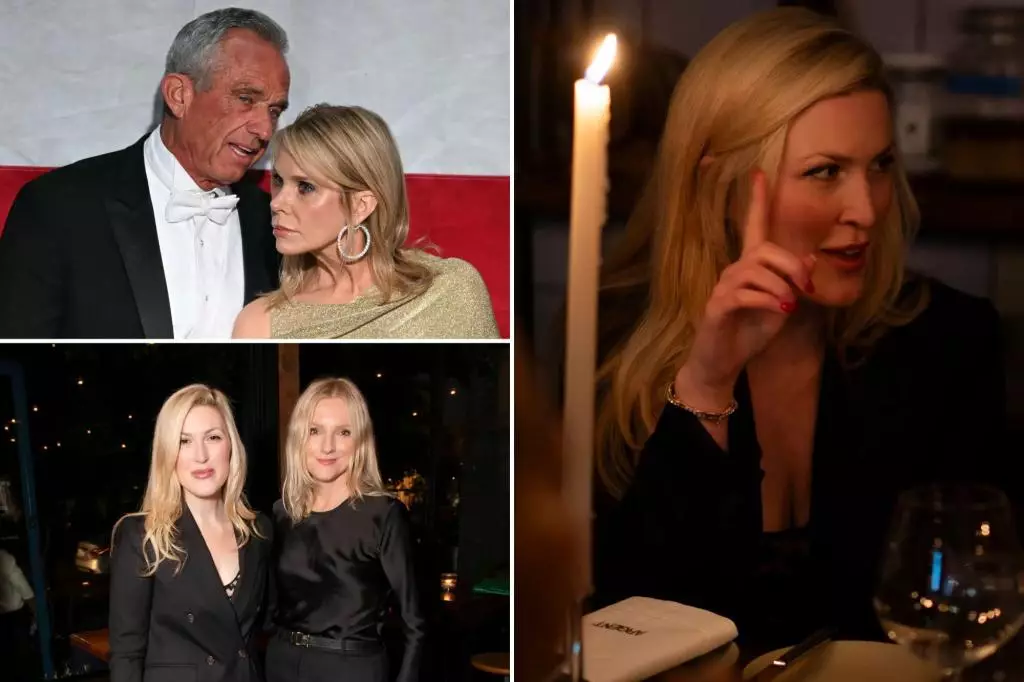The public lives of prominent figures can often spiral into complicated narratives filled with intrigue, conflict, and emotions. Olivia Nuzzi, the journalist currently in the eye of a media storm, has found herself grappling with the aftermath of a high-profile romantic entanglement, which has significant implications for her career and personal image. Recently seen at an upscale event in Los Angeles, Nuzzi was unable to escape the scrutiny that has followed her since the unfolding of her relationship with Robert F. Kennedy Jr. and the repercussions of her breakup with Ryan Lizza.
Despite the tumult surrounding her personal life, Nuzzi appeared radiant at a fashion gathering hosted by the popular clothing line, Argent. Known for being a favorite among various celebrities, the label boasts an impressive following including name personalities such as Meghan Markle and Jessica Alba. Eyewitnesses noted Nuzzi’s elegance in a black suit paired with a diamond tennis bracelet reportedly gifted to her by Lizza during happier times. In light of the ongoing controversies, her appearance symbolizes a moment of resilience; she reportedly received a warm reception at the event, reinforcing the “show must go on” mentality often seen within high-profile circles.
Nuzzi’s public foray since the sexting scandal erupted, resulting in her temporary leave from New York Magazine, presents a dual narrative. On one hand, she symbolizes the struggle of an individual under heavy scrutiny; on the other, she represents the kind of glamour that still captivates public interest. Attendees, including well-known figures like Ava DuVernay and Kate Mara, surrounded Nuzzi, negating the notion that her actions define her entire identity in the media landscape.
One particularly striking aspect of the ongoing saga is the way society tends to judge and critique women involved in public controversies compared to their male counterparts. Insider commentary suggests that Nuzzi is being singled out for a broader systemic issue prevalent in media culture: the stigmatization of women in positions of power or influence who partake in romantic relationships with male figures. As one insider remarked, the backlash against Nuzzi seems excessively punitive when measured against similar infractions committed by men within the same sphere.
This reflection raises essential questions about cultural standards and how these standards can be unnecessarily punitive based on gender. The nuance here hinges on whether we are willing to accept human complexities without reducing individuals to their public persona shaped largely by tabloid narratives and sensationalized details.
At the core of this evolving story lies the tangled relationship between Nuzzi, Lizza, and RFK Jr. The dissolution of her engagement with Lizza—together with allegations that he threatened her—adds layers of complexity to the narrative. While the discourse often gravitates toward sensationalism surrounding celebrity relationships, the grave accusations brought forward by Nuzzi related to blackmail and reputational harm prompt a deeper reflection on the ramifications of personal relationships in the public eye.
Court interactions detail accusations from both sides, revealing a bitter rupture filled with allegations of infidelity, manipulation, and emotional turmoil. Lizza’s defense notably included claims that Nuzzi engaged in an extramarital affair with RFK Jr., heightening the stakes and pulling other individuals into the fray. As this story continues to develop in real-time, it showcases how personal grievances can morph into public drama, with the individuals involved often becoming unwilling participants in media-created narratives.
Nuzzi’s presence at the event raises significant considerations about personal reinvention within the arena of public life. As she navigates this treacherous terrain, her situation reflects a broader phenomenon where individuals find ways to emerge stronger and more resilient despite overwhelming odds. Eyewitness reports from the Los Angeles gathering indicate that Nuzzi seemed composed, hinting at the possibility of her using this challenging chapter as a stepping stone toward personal growth.
For many in the public sphere, moments like these serve as critical inflection points, molding their narratives and career trajectories. While social media and public discussion amplify their experiences, the fundamental challenge remains: how to retain authenticity amid a swirl of judgment and speculation. It will be interesting to observe how Nuzzi channels these experiences as she strives to redefine her persona beyond the current narrative.
Olivia Nuzzi’s situation encapsulates the multifaceted challenge of living in the public eye, where personal decisions ripple outwards, influencing not just individual lives but societal perceptions of gender, relationships, and resilience. As we witness her journey unfold, it serves as a reminder of the complexities inherent in personal relationships and the public scrutiny that often accompanies them.

